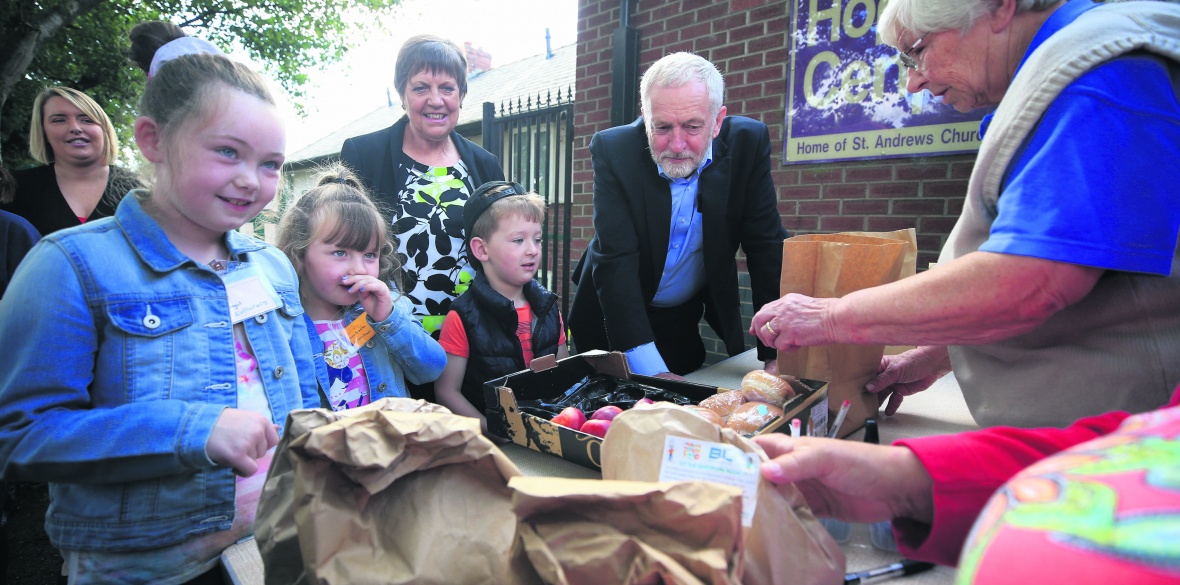This is the last article you can read this month
You can read more article this month
You can read more articles this month
Sorry your limit is up for this month
Reset on:
Please help support the Morning Star by subscribing here
RECENT weeks have seen the release of a number of reports and statistics that show the shocking extent of human suffering that Tory austerity is causing in Britain, but as we have come to expect in recent years they — and Labour’s policy alternatives to deal with spiralling levels of poverty and inequality — have received little media attention.
These problems will continue as long as the same economic strategy of recent years that has seen the richest 1 per cent watch their wealth double while ordinary families struggle to make ends meet continues to be the government’s economic strategy.
Whatever the Tories say, it is becoming clearer by the month that cuts have consequences and the longer the Tories’ austerity project goes on the clearer and more widespread these become.
The level of Tory denial about the results of their policies and economic approach was shown recently when Social Mobility Commission chief Dame Martina Milburn claimed that the massive cuts we’ve seen since 2010 to our public services and welfare state haven’t damaged people’s life chances.
To take one example, it has recently been confirmed we have more families than ever reliant on food banks and a wide range of charities have recently exposed how this “holiday hunger” for kids is rife, with the latest Trussell Trust report showing increased foodbank need during the summer holidays.
This “holiday hunger” is a national scandal and the government should hang their collective heads in shame.
Furthermore, it is part of a continued wider increase in the use of foodbanks. The Trussell Trust said its 400-strong network gave out a record 1.3m food parcels to an estimated 666,000 people in 2017-18 — up 13 per cent on the previous year.
Within this context, it was recently revealed by the Guardian that ministers have secretly drawn up plans to investigate whether the government’s own policies are to blame for the sharp rise in the use of food banks.
Specifically, two of the most senior officials at the Department for Work and Pensions (DWP) have been tasked with overseeing the study, according to a draft proposal, which is marked: “Official — Sensitive” and the four-page document, dated June 2018, says a key objective is “to identify any areas of DWP policy or operational practice that may have contributed to a rise in demand for food bank services.”
To be frank, this is too little, too late.
Tory ministers have again and again refused to accept that their cuts have consequences and that austerity measures, including the hugely damaging introduction of universal credit, are in any way responsible for the huge increase in people needing emergency help.
Yet the Trussell Trust has said that, in areas where universal credit had been in place for 12 months or more, food banks were four times as busy as in other areas.
Furthermore, a 2017 study from Oxford University academics warned that benefit freezes and welfare changes such as universal credit and cuts to disability payments were likely to drive up food bank use in future years.
These examples of increased food bank use are part of a broader situation where child poverty in Britain shows no sign of slowing down. Over four million children are growing up in poverty and the government’s own statistics show that just in the last year there are 100,000 more children in poverty.
These shocking levels of child poverty and the very real effects of this were also illustrated in a recent revelation from the subject association for PE Teachers, whose chief executive said in a Times Education Supplement (TES) interview that children living in poverty are reluctant to get changed in PE classes because they are ashamed of “skinny” bodies.
She added that these children were not simply “thin” but “underweight and malnourished.”
And contrary to government claims that it is making work pay, the reality is that the vast majority of the 4.1 million children in poverty today have a mum or dad in work and, furthermore, these levels of poverty are in a situation of inequality that is out of control.
We now have the joint sixth most unequal incomes of 30 countries in the developed world.
In austerity Britain, while the top fifth have 40 per cent of the country’s income and 60 per cent of the country’s wealth, the bottom fifth have only 8 per cent of the income and only 1 per cent of the wealth.
These are the real human costs of austerity, which is ruining millions of lives and this is why the labour movement and progressive forces need to restate again and again that austerity is a political choice not an economic necessity.
This couldn’t be more important, as is explaining what the actual human costs of the Tories cuts are and why Labour’s credible and coherent economic alternative can not only achieve sound and sustainable economic growth, but use this to provide the quality of life for all we need.
A Jeremy Corbyn-led Labour government elected on a programme of investing in our future — not ideologically driven cuts that heighten poverty and inequality — can provide this alternative economic strategy.
Then, with a better, rebalanced economy, our children and grandchildren can grow up in a world where things get better. The alternative is yet more human suffering and misery under the Tories.
You can follow Ken at www.twitter.com/ken4london and www.facebook.com/kenlivingstoneofficial











